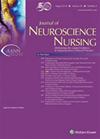医疗保健专业人员的脑电图能力:自我评估与客观测试之间的脱节。
IF 2
3区 医学
Q4 CLINICAL NEUROLOGY
引用次数: 1
摘要
摘要:背景:医疗保健专业人员(HCP)在进行高质量脑电图(EEG)时的作用是确保准确结果的关键。本研究通过对医护人员主客观脑电能力评估的分析,为医护人员的脑电能力和能力需求提供信息,为医护人员的教育培训提供依据。方法:本研究为描述性横断面研究。该研究的目标群体是在芬兰大学医院临床神经生理学部门工作的医护人员。研究数据采集采用为本研究设计的脑电能力仪。该仪器由自我评估部分和知识测试部分组成。结果:受试者(N = 65;应答率为81%),包括34名注册护士和31名实验室技术人员。自评部分,患者观察得分最高(平均4.6分),脑电图理论知识得分最低(平均3.9分)。在测试部分,绝大多数(73.8%)答对了所有问题(最高6分)。年龄、工作经验、自己对脑电图能力的满意度与主观自我评价呈正相关。熟悉脑电图指南和参加过培训日的患者对能力的评价显著提高(P < 0.05)。阅读脑电图相关文献的回答者更好地识别了他们自己的工件(P = .005)。结论:实验室技术人员和注册护士主客观脑电能力评价较高。今后,脑电图能力测试仪还需进一步发展,并对其心理测量特性进行更多的研究,以进一步了解医护人员在诊断过程中的能力。本文章由计算机程序翻译,如有差异,请以英文原文为准。
Healthcare Professionals' Electroencephalography Competency: A Disconnect Between Self-Assessment and Objective Testing.
ABSTRACT BACKGROUND: The role of the healthcare professional (HCP) in performing high-quality electroencephalography (EEG) is critical to ensuring accurate results. This study analyzes HCPs' subjectively and objectively assessed EEG competence to provide information on their EEG competence and competence needs for the development of their education and training. METHODS: The study was a descriptive cross-sectional study. The target group of the study was HCPs working in the clinical neurophysiology departments of university hospitals in Finland. The research data were collected using the EEG Competence instrument created for this research. The instrument consisted of a self-assessment section and a knowledge test component. RESULTS: The participants (N = 65; response rate, 81%) consisted of 34 registered nurses and 31 laboratory technologists. In the self-assessment section, the highest mean score was in patient observation (mean, 4.6) and the lowest was in EEG theoretical knowledge (mean, 3.9). In the test section, most of the respondents (73.8%) answered all questions correctly (maximum, 6 points). There was a positive correlation between age, work experience, own satisfaction with EEG competence, and subjective self-assessment. Those familiar with EEG guidelines and who participated in training days assessed their competence as significantly better (P < .05). Respondents who read EEG-related literature on their own identified artifacts better (P = .005). CONCLUSIONS: Laboratory technologists' and registered nurses' subjectively and objectively assessed EEG competence was high. In the future, the EEG competence instrument should be developed further, and more research is needed to assess its psychometric properties to provide more information on HCPs' competence in the diagnostic process.
求助全文
通过发布文献求助,成功后即可免费获取论文全文。
去求助
来源期刊

Journal of Neuroscience Nursing
CLINICAL NEUROLOGY-NURSING
CiteScore
3.10
自引率
30.40%
发文量
110
审稿时长
>12 weeks
期刊介绍:
The Journal of Neuroscience Nursing (JNN), the official journal of the American Association of Neuroscience Nurses, contains original articles on advances in neurosurgical and neurological techniques as they affect nursing care, theory and research, as well as commentary on the roles of the neuroscience nurse in the health care team.
The journal provides information to nurses and health care professionals working in diverse areas of neuroscience patient care such as multi-specialty and neuroscience intensive care units, general neuroscience units, combination units (neuro/ortho, neuromuscular/rehabilitation, neuropsychiatry, neurogerontology), rehabilitation units, medical-surgical units, pediatric units, emergency and trauma departments, and surgery. The information is applicable to professionals working in clinical, research, administrative, and educational settings.
 求助内容:
求助内容: 应助结果提醒方式:
应助结果提醒方式:


